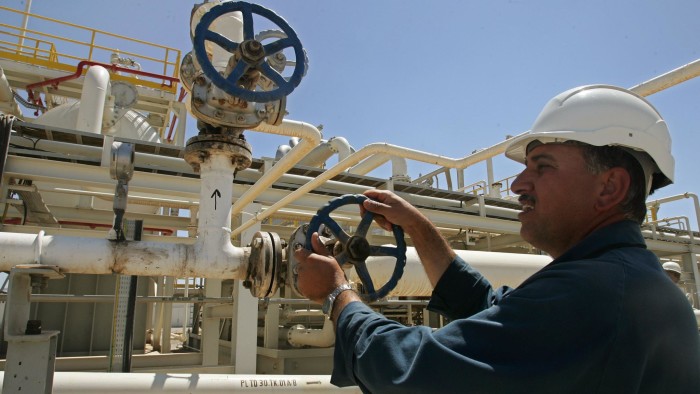Hedge funds bet big on oil price rally

Simply sign up to the Oil myFT Digest -- delivered directly to your inbox.
Hedge funds have placed one of their largest ever bets on a rally in oil prices, just as evidence mounts that energy companies are hunkering down for a delayed recovery.
Exchange data show hedge funds and other large speculators have accumulated a record-breaking number of North Sea Brent futures and options contracts equal to almost 265m barrels of oil — the equivalent of almost three days of global oil demand.
At the same time, oil producers and other physical market players have rushed to lock-in prices, selling forward more than half a billion Brent barrels in a bid to protect against future price falls. It is the highest level since the Intercontinental Exchange (ICE) started publishing position data in early 2011.
The split was clear this week at two major conferences on opposite sides of the Atlantic. Hedge fund managers, bankers and trading houses at the FT Commodities Global Summit in Lausanne, Switzerland, were largely of the view that oil prices have bottomed. Brent hit a 2015 high above $65 a barrel on Thursday, having slumped to a five-year low near $45 a barrel in January.
“We see the supply side falling away very quickly here,” Paul Horsnell, head of commodities research at Standard Chartered, told the FT Summit. Mr Horsnell forecasts Brent could rise above $80 a barrel in the third quarter of this year.
At the same time in Houston, the chief executives of some of the world’s largest energy majors warned they expect prices to stay at lower levels even if the boom in US shale oil output begins to falter. US crude inventories stand at the highest level in 80 years and have risen for 15 consecutive weeks.
“Lower for longer is how you would describe our view,” Bob Dudley, BP chief executive, told the annual IHS CERAWeek conference.
Rex Tillerson, chief executive of ExxonMobil, the world’s largest publicly traded oil company by market value, said the industry needed to “settle in” for lower prices “for at least a couple of years”.
The extreme division in the oil market may make prices more volatile as both sides try to predict how Opec’s attempt to recapture market share from higher cost producers plays out.
The collapse in prices from around $115 a barrel in June has seen the number of rigs drilling for oil in the US fall by more than half, according to oilfield services group Baker Hughes, as cash-strapped producers scramble to refocus their operations on only the most productive shale prospects.
Energy companies have also slashed investments worldwide to preserve capital and maintain dividends to shareholders, raising fears they risk storing up shortages in years to come.
Opec has increased production, since deciding not to cut output to support the oil price at its November meeting, focusing on shoring up its own share of the world market that had been hit by rising production outside the group.
“That will translate into more volatility both upward and downward as you basically have a market that is forced to balance itself,” Yusuf Alireza, chief executive of commodity trader Noble Group told the FT Summit.
While Brent hit its highest this year on Thursday, boosted by rising demand and Saudi Arabian-led air strikes on rebels in Yemen, the large hedge fund bet on Brent may pose a risk to further gains.
The previous record hedge fund position in Brent came in June last year as militants from Islamic State of Iraq and the Levant advanced in Iraq — just before rising supplies in the market saw prices begin their near 60 per cent crash.
One hedge fund manager said he did not want to run with the crowd. “For me I still think we need to go a lot lower,” said Pierre Andurand, a French energy hedge fund manager in London who returned around 40 per cent last year betting on oil’s decline.
“It’s still too early to know if the demand pick-up is likely to stay. Even if it is good, it is still much lower than supply,” he added.
Additional reporting by Ed Crooks and Christopher Adams
Comments